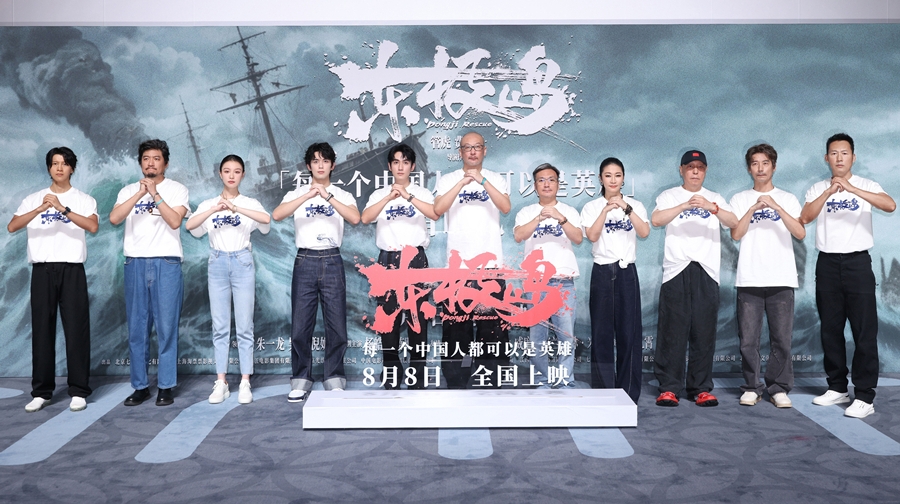The Chinese film "Dongji Rescue" premiered in Beijing on Aug. 5, retelling the harrowing story of Japanese atrocities against British prisoners of war during World War II and the daring rescue of the war prisoners by Chinese fishermen.

A still from "Dongji Rescue." [Photo courtesy of Seventh Art Pictures]
Co-directed by Guan Hu and Fei Zhenxiang, and starring Zhu Yilong, Wu Lei and Ni Ni, the film is based on historical events aboard the Lisbon Maru in 1942. The freighter, requisitioned by the Japanese army to transport over 1,800 British POWs from Hong Kong to Japan, was unmarked and mistakenly torpedoed by a U.S. submarine off Dongji islands in Zhoushan, Zhejiang province.
In order to cover up the incident, Japanese troops cruelly battened the POWs below deck, leaving them to drown with the sinking vessel, and even opened fire on those who tried to escape.
The film focuses on the local Chinese fishermen, who initially hid in fear of Japanese reprisals but were spurred to act by outrage and compassion. Defying danger, they saved 384 POWs.
"Dongji Rescue" is a flagship release marking the 80th anniversary of the victory in the Chinese People's War of Resistance Against Japanese Aggression and the World Anti-Fascist War.
The film is the result of six years of meticulous preparation and an intensive seven-month shoot. Highlights include the longest sustained real-water filming ever attempted in Chinese cinema, the construction of full-scale ships and authentic fishing villages, and advancements in underwater cinematography and special effects. According to the filmmakers, the scale and technical complexity of "Dongji Rescue" matched that of three typical movie productions combined.
At the Beijing premiere, director Guan emphasized the humanitarian spirit that inspired the film.
"This film demonstrates how Chinese fishermen and ordinary citizens actively contributed to the World Anti-Fascist War," Guan said. "When Japan attempts to alter or distort history, this film stands as both warning and revelation, exposing buried truths while honoring the heroic resistance and compassion of ordinary people."
Director Fei, Guan's collaborator and protégé, said that what they achieved underwater was "unprecedented" in Chinese cinema history. He revealed that during pre-production, they consulted numerous top international teams about underwater filming techniques. The responses were unanimous: achieving such large-scale, authentic underwater shooting would be a mission impossible.
"That only fueled my determination and we finally made it," Fei recalled. The production included grueling underwater training for the actors and the development of new filming technology.

A still from "Dongji Rescue." [Photo courtesy of Seventh Art Pictures]
"Our team developed new techniques during filming, essentially blazing a new trail for Chinese-language cinema and offering reference methods for future underwater film crews," said producer Liang Jing.
"During production, we truly became part of Dongji islands," Liang said. "The Chinese people have made significant contributions to world peace, especially in how we still reached out to save others despite being oppressed ourselves. This story reflects why China is rising on the world stage today. Our ancestors embodied this national spirit of righteousness and compassion. This history shouldn't just be seen by Chinese audiences, but by Japanese viewers and the entire world!"
Last year's acclaimed documentary "The Sinking of the Lisbon Maru," directed by Fang Li, helped bring the story to wider attention after eight years of research across China, Britain, Japan, the U.S. and Canada. Fang, who attended the premiere, said he was awestruck by "Dongji Rescue."
"I focused on the suffering of British POWs, but the 'Dongji Rescue' creators expanded the Chinese perspective so grandly," he said. "They actually filmed in real locations with real people, raw emotions, authentic sound effects and the actual sea. And they pulled it off."
The production broke new ground for Chinese cinema, reconstructing the Lisbon Maru at full scale and building 20 seaworthy fishing boats. Produced as part of the Filmed for IMAX program, the crew used IMAX cameras to film the ship's sinking and the fishermen's rescue on location in the open ocean. Complex underwater sequences were shot in Asia's largest water tank, a 9,000-square-meter facility in Yangzhou, Jiangsu province, capable of simulating 200 wave patterns.

The cast and crew of "Dongji Rescue" greet the audience at the film's premiere in Beijing, Aug. 5, 2025. [Photo courtesy of Dark Horse Entertainment]
In the film, lead actors Zhu Yilong, Wu Lei and Ni Ni deliver unvarnished performances, fully inhabiting their roles as coastal villagers. Zhu's character anchors the film, transitioning from a brooding, violent figure to a determined fighter motivated by loyalty and survival. His portrayal brings both emotional intensity and the forceful response audiences expect from wartime dramas, capturing themes of sacrifice and resistance.
"Dongji Rescue" is set to open in theaters across China on Aug. 8, with international releases including the U.K. and U.S. scheduled for Aug. 22.


 Share:
Share: 




 京公网安备 11010802027341号
京公网安备 11010802027341号